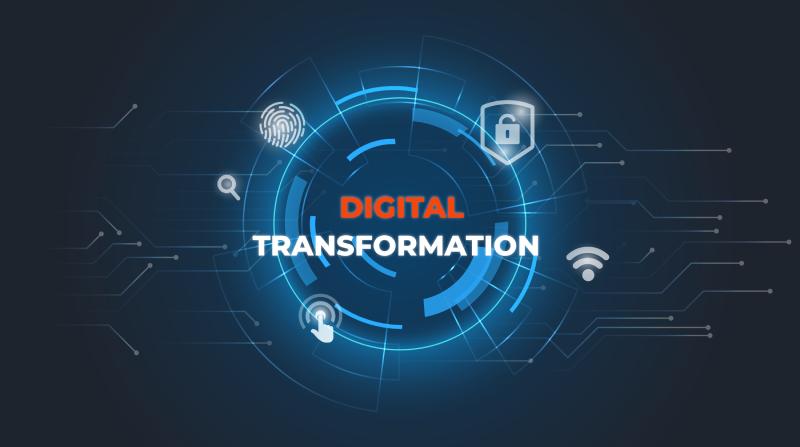In today’s fast-paced digital era, digital transformation has evolved from a buzzword to a key strategic initiative for enterprises worldwide. The transformation process involves integrating digital technologies into every aspect of business, fundamentally changing how companies work and deliver value to their customers.
Looking to the future, several key trends and technologies will shape the next wave of digital transformation and drive innovation and growth. Among them, a focus on complete cyber recovery has become paramount to enable organizations to recover quickly and effectively from cyber incidents.
Leveraging Artificial Intelligence and Machine Learning
In recent years, AI and ML have driven digital transformation, providing enterprises with comprehensive opportunities to improve productivity, make better decisions, and deliver customized customer experiences. AI and ML enable businesses to analyze large amounts of data in a short time and identify patterns that are not immediately obvious.
These two technologies are being used more widely in natural language processing, computer vision, and precise predictive analytics, leading to the creation of intelligent systems that can make decisions on their own.
For example, artificial intelligence in chatbots and virtual personal assistants is expected to transform the way customers interact with businesses by providing instant, personalized support. With such intelligent self-service platforms, complex requests are managed effectively and fewer employees are needed to handle the requests.
Moreover, AI-based predictive analytics can also help businesses better understand customer needs and avoid potential issues that may affect purchasing behavior, thereby increasing customer satisfaction and loyalty.
The Rise of Edge Computing
Given the volume of data generated by these connected devices, the demand for the traditional model of cloud computing, now supported by edge computing, continues to grow. As an alternative to data processing in centralized data centers, edge computing takes place closer to the data source, at the edge of the network. This eliminates latency and improves the efficiency of processing real-time data, improving application performance.
As far as digital transformation is concerned, edge computing will assume a key function of installing Internet of Things (IoT) devices and applications. The application of edge computing will extend to smart cities and autonomous vehicles, industrial automation and intelligent healthcare, where data can be processed and actions can be taken in real time, becoming a key driver for new business models and improved business operations across various industries.
Advances in Blockchain Technology
Although initially associated with digital currency, blockchain technology has emerged as one of the most promising technologies for digital transformation. It is decentralized and immutable, providing absolute levels of security, transparency and trust. This makes it suitable for many uses beyond currency exchange.
Blockchain is expected to revolutionize other sectors such as supply chain, healthcare and finance. For example, blockchain supply chain applications could enable full visibility of the supply chain and allow verification of product authenticity and integrity between supply chain partners.
In the healthcare sector, blockchain will drive the move towards shared electronic health records that are more secure and give patients control over their own records. The use of blockchain will also benefit financial service providers, as transactions can be carried out with less time, security and cost.
The Advent of 5G Networks
The rollout of new 5G networks is a major breakthrough in digital development. They will provide faster, lower latency Internet connections, redefining what is possible for businesses and individuals. 5G technology will facilitate the creation of trillions of connections in IoT, smart cities and augmented reality applications.
For businesses, 5G will provide the opportunity to take advantage of mission-critical applications characterized by the need to process real-time data and massive bandwidth. 5G networks will revolutionize sectors such as manufacturing, healthcare and logistics, enabling the introduction of technologies such as robotics, remote surgery and autonomous transport systems.
The Importance of Cybersecurity in the Digital Era
With the increasing trend towards digitalization, it is important to have strong measures to prevent cyber threats. The growth of the internet and the use of technology has opened the door for hackers to attack businesses, increasing cyber risks. As more businesses adopt new technologies, it is important to protect their online presence and ensure customer trust by implementing the best security technologies.
AI and ML will be integrated into future cybersecurity plans to identify threats in real-time and take steps to protect organizations. These intelligent systems will scan these huge amounts of data and look for patterns that characterize attacks, which helps in early detection. Additionally, we will see an increase in the implementation of Zero Trust security frameworks, where all entities inside and outside the network are considered untrusted until they are verified and have the correct credentials to access critical resources.
Conclusion
Digitalization is future-oriented in terms of constant innovation in technology and business strategies. AI and ML, edge computing, blockchain, 5G, and better cybersecurity measures are some of the trends that will continue to shape the evolution of technology and provide opportunities for businesses in the future economy. This is especially important as businesses begin their digital transformation process and need to adapt to such changes and leverage the right technologies for growth and success.
- World Meditation Day 2024: The Emotional Growth Benefits of Mindfulness for Kids - December 21, 2024
- Bryson DeChambeau will make international history in his first tournament of the year - December 21, 2024
- Disney’s ‘Mufasa: The Lion King’: Who Is the Voice of the Legendary King? - December 21, 2024





